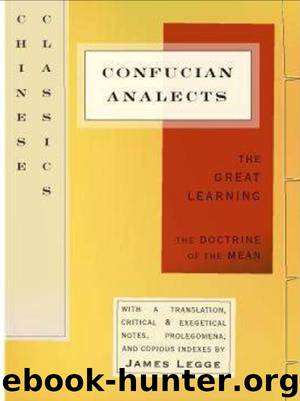Analects, Great Learning, and Doctrine of the Mean by Confucius

Author:Confucius
Language: eng
Format: mobi
Publisher: Liberty Fund, Inc.
Published: 2010-09-07T23:00:00+00:00
II.
THE CLASSICS
CONFUCIAN ANALECTS
BOOK I
CHAPTER1. The Master said, “Is it not pleasant to learn with a constant perseverance and application?
2. “Is it not delightful to have friends coming from distant quarters?
3. “Is he not a man of complete virtue, who feels no discomposure though men may take no note of him?”
1. Yew the philosopher said, “They are few who, being filial and fraternal, are fond of offending against their superiors. There have been none, who, not liking to offend against their superiors, have been fond of stirring up confusion.
2. “The superior man bends his attention to what is radical. That being established, all right practical courses naturally grow up. Filial piety and fraternal submission!—are they not the root of all benevolent actions?”
The Master said, “Fine words and an insinuating appearance are seldom associated with true virtue.”
Tsăng the philosopher said, “I daily examine myself on three points:—whether, in transacting business for others, I may have been not faithful;—whether, in intercourse with friends, I may have been not sincere;—whether I may have not mastered and practised the instructions of my teacher.”
The Master said, “To rule a country of a thousand chariots, there must be reverent attention to business, and sincerity; economy in expenditure, and love for the people; and the employment of them at the proper seasons.”
The Master said, “A youth, when at home, should be filial, and, abroad, respectful to his elders. He should be earnest and truthful. He should overflow in love to all, and cultivate the friendship of the good. When he has time and opportunity, after the performance of these things, he should employ them in polite studies.”
Tsze-hea said, “If a man withdraws his mind from the love of beauty, and applies it as sincerely to the love of the virtuous; if, in serving his parents, he can exert his utmost strength; if, in serving his prince, he can devote his life; if, in his intercourse with his friends, his words are sincere:—although men say that he has not learned, I will certainly say that he has.”
1. The Master said, “If the scholar be not grave, he will not call forth any veneration, and his learning will not be solid.
2. “Hold faithfulness and sincerity as first principles.
3. “Have no friends not equal to yourself.
4. “When you have faults, do not fear to abandon them.”
Tsăng the philosopher said, “Let there be a careful attention to perform the funeral rites to parents when dead, and let them be followed when long gone with the ceremonies of sacrifice;—then the virtue of the people will resume its proper excellence.”
1. Tsze-k‘in asked Tsze-kung, saying, “When our Master comes to any country, he does not fail to learn all about its government. Does he ask his information? or is it given to him?”
2. Tsze-kung said, “Our Master is benign, upright, courteous, temperate, and complaisant, and thus he gets his information. The Master’s mode of asking information!—is it not different from that of other men?”
The Master said, “While a man’s father is alive, look at the bent of his will; when his father is dead, look at his conduct.
Download
This site does not store any files on its server. We only index and link to content provided by other sites. Please contact the content providers to delete copyright contents if any and email us, we'll remove relevant links or contents immediately.
| Confucianism | Feng Shui |
| I Ching | Jainism |
| Karma | Shintoism |
| Sikhism | Tao Te Ching |
| Taoism | Tibetan Book of the Dead |
| Zoroastrianism |
The Tao of Physics by Fritjof Capra(2266)
Human Design by Chetan Parkyn(2068)
The Diamond Cutter by Geshe Michael Roach(2058)
Feng Shui by Stephen Skinner(1936)
The Alchemy of Sexual Energy by Mantak Chia(1850)
Tao Te Ching by Lao Tzu(1834)
365 Tao: Daily Meditations by Ming-Dao Deng(1616)
Tao Tantric Arts for Women by Minke de Vos(1585)
Sun Tzu's The Art of War by Giles Lionel Minford John Tzu Sun(1531)
Sidney Sheldon (1982) Master Of The Game by Sidney Sheldon(1512)
Buddhism 101 by Arnie Kozak(1507)
Karma-Yoga and Bhakti-Yoga by Swami Vivekananda(1487)
The Analects of Confucius by Burton Watson(1424)
The Art of War Other Classics of Eastern Philosophy by Sun Tzu Lao-Tzu Confucius Mencius(1411)
Tao te ching by Lao Tzu(1356)
The Way of Chuang Tzu by Thomas Merton(1346)
The New Bohemians Handbook by Justina Blakeney(1340)
The Sayings Of by Confucius(1303)
Bless This House by Donna Henes(1267)
